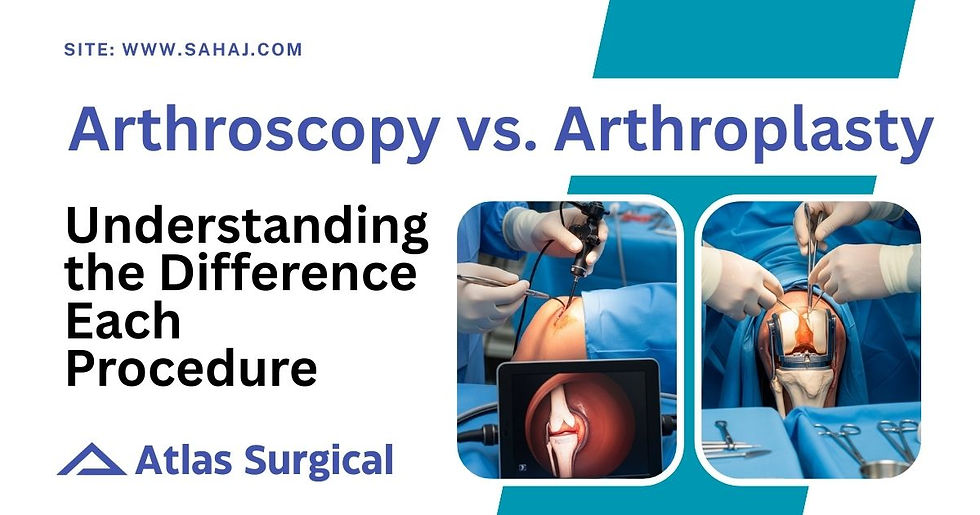Arthroscopy vs. Arthroplasty: Understanding the Difference and When Each Procedure Is Performed
- Aniket Kharwar
- Sep 5, 2025
- 4 min read
When it comes to treating joint pain or damage, two terms often come up in discussions with orthopedic specialists: arthroscopy and arthroplasty. While they sound similar, these procedures are quite different in purpose, technique, and recovery. For patients, caregivers, and even healthcare buyers, understanding these differences can help in making informed decisions about treatment and equipment needs.
At Atlas Surgical, a trusted manufacturer and supplier of orthopedic instruments and implants, we understand how crucial clarity is—both in surgical precision and in patient education. In this guide, we’ll explain arthroscopy and arthroplasty in simple terms, outline when each is recommended, and highlight how modern surgical instruments and implants improve patient outcomes.

What Is Arthroscopy?
Arthroscopy is a minimally invasive surgical procedure that allows doctors to look inside a joint using a small camera, called an arthroscope.
Key Features of Arthroscopy:
Minimally Invasive – Small incisions instead of large cuts.
Diagnostic & Therapeutic – Helps doctors both diagnose joint problems and treat them at the same time.
Quick Recovery – Patients typically experience less pain and faster healing compared to open surgery.
Common Uses of Arthroscopy:
Torn meniscus or cartilage in the knee
Rotator cuff injuries in the shoulder
Ligament reconstruction (e.g., ACL surgery)
Removal of loose bone or cartilage fragments
Early-stage arthritis treatment
Benefits for Patients:
Reduced pain and scarring
Lower risk of infection
Shorter hospital stays
Faster return to daily activities
Atlas Surgical provides precision-designed arthroscopic instruments that ensure surgeons can perform these procedures safely and effectively, from shavers and forceps to specialized scopes.
What Is Arthroplasty?
Arthroplasty refers to surgical procedures that restore the function of a damaged joint, usually by replacing or resurfacing it. The most common type is joint replacement surgery.
Key Features of Arthroplasty:
Joint Replacement – Damaged bone and cartilage are replaced with artificial implants.
Implant Materials – Often made of stainless steel, titanium, or medical-grade polymers.
Major Surgery – More invasive than arthroscopy, but essential for severe joint damage.
Common Types of Arthroplasty:
Total Knee Replacement (TKR)
Hip Replacement
Shoulder Replacement
Partial Joint Replacement (when only part of the joint is damaged)
Benefits for Patients:
Significant pain relief
Improved joint mobility
Long-term durability with modern implants
Better quality of life for those with severe arthritis or joint degeneration
Atlas Surgical manufactures high-quality orthopedic implants and instruments for arthroplasty procedures, including stainless steel and titanium options that provide surgeons with durable, biocompatible solutions.
Arthroscopy vs. Arthroplasty: Key Differences
Feature | Arthroscopy | Arthroplasty |
Purpose | Diagnose & treat minor to moderate joint issues | Replace or reconstruct severely damaged joints |
Invasiveness | Minimally invasive | Major surgery |
Implants | Usually none | Requires implants (metal, ceramic, polymer) |
Recovery Time | Weeks | Months |
Best For | Sports injuries, cartilage tears, early arthritis | Severe arthritis, advanced joint damage |
When Is Arthroscopy Recommended?
Doctors may recommend arthroscopy if:
Joint pain is not responding to medication or physical therapy
Imaging (MRI, X-ray) shows minor tears or damage
The goal is to repair or clean the joint rather than replace it
This is common in younger or more active patients, where preserving the natural joint is preferable.
When Is Arthroplasty Recommended?
Arthroplasty is usually suggested when:
Joint damage is severe due to osteoarthritis, rheumatoid arthritis, or trauma
Pain limits daily activities, even with conservative treatments
Joint deformity or stiffness prevents mobility
Arthroscopy or other less invasive methods are not effective
It is often the best option for older patients or those with advanced arthritis who want long-term relief.
Role of Surgical Instruments and Implants
Both arthroscopy and arthroplasty rely heavily on specialized equipment.
For Arthroscopy:
Arthroscopes
Trocar & cannulas
Graspers, scissors, and shavers
Fluid management systems
For Arthroplasty:
Orthopedic implants (stainless steel & titanium)
Surgical power tools and drill bits
Forceps, retractors, and orthopedic screw systems
Precision plates and locking systems
Atlas Surgical supplies hospitals and orthopedic surgeons with a complete range of arthroscopy and arthroplasty instruments—engineered for durability, precision, and global healthcare standards.
Stainless Steel vs. Titanium in Orthopedic Implants
One of the most common questions buyers and doctors ask is: Which is better—stainless steel or titanium implants?
Stainless Steel: Cost-effective, durable, widely used for temporary implants.
Titanium: Lightweight, stronger, highly biocompatible, ideal for long-term implants.
At Atlas Surgical, we provide both stainless steel and titanium options to meet diverse surgical needs and budgets.
Why Atlas Surgical?
Over decades of experience in manufacturing medical instruments and implants
Trusted by hospitals, surgeons, and distributors globally
Wide range of orthopedic solutions including plates, screws, nails, arthroscopy tools, and joint replacement implants
Commitment to quality, precision, and patient safety
Conclusion: Choosing the Right Procedure
Both arthroscopy and arthroplasty play vital roles in modern orthopedic care. While arthroscopy helps diagnose and treat less severe joint issues with minimal recovery time, arthroplasty provides life-changing relief for patients with advanced joint damage.
Choosing between the two depends on factors like the severity of joint damage, patient age, activity level, and long-term goals. With the right surgical instruments and implants, outcomes can be significantly improved.
At Atlas Surgical, we are dedicated to supporting surgeons, hospitals, and patients worldwide with top-quality orthopedic implants, arthroscopy equipment, and surgical instruments.
If you are a hospital, distributor, or healthcare professional looking for trusted orthopedic instruments and implants, connect with Atlas Surgical today.
📞 Contact us to learn more about our arthroscopy and arthroplasty product range.
🌐 Visit our website to explore our stainless steel and titanium orthopedic solutions.
📩 Reach out for orders, bulk supply, or partnership inquiries.
Atlas Surgical – Crafting Precision. Delivering Globally.



Comments